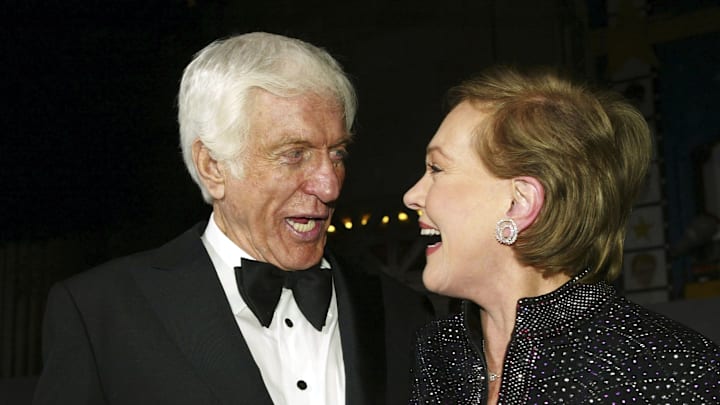Mary Poppins (1964) has long been celebrated as one of the best children’s films of all time. The Disney feature, which was adapted from the P.L. Travers book of the same name, features Julie Andrews as a nanny with a magical touch and Dick Van Dyke as a chimney sweep. But according to the British Board of Film Classification (BBFC), some additional parental guidance is now being suggested.
The cause? The film's use of the word hottentots.
The BBC reports that the BBFC has recently re-classified the film’s rating. Originally labeled U, which is roughly the equivalent of the American G rating, the board has now applied a PG rating after deciding the film’s two uses of “hottentots” warrant parental oversight.
The term is considered derogatory language that was once directed at Southern Africans by white Europeans. It referred to the San and the Khoikhoi, hunter-gatherers who used a clicking sound for consonants. The Dutch used hottentot, or stutterer, to describe them, a term that became an identifier for residents of southwest Africa from the 16th to 19th centuries. According to The Oxford English Dictionary, it was eventually co-opted to describe someone who was perceived as inferior or uncivilized.
In Mary Poppins, a character invokes it in reference to chimney sweeps covered in soot.
Under BBFC guidelines, use of a racial slur would move a film outside the parameters of a U classification, particularly if the context in which it’s presented doesn’t condemn the terminology. In the case of Mary Poppins, the board re-evaluated the rating after the film was submitted in advance of a theatrical re-release.
In the UK, films are typically slotted into U, for all audiences; PG, when parental oversight is recommended; 12A or 12, meant for audiences over age 12; 15, for those 15 and over; 18, for adults; and R18, for sexually explicit material.
The BBFC has demonstrated a willingness to reclassify films in the past. In 2020, Rocky (1976) was moved from a PG to a 12A owing to its violent boxing and domestic abuse: the volatile Paulie, played by Burt Young, berates and emotionally abuses his sister, Adrian, played by Talia Shire.
Flash Gordon (1980) received a modified rating—from PG to 12A—for the alleged discriminatory stereotype of Ming the Merciless (Max von Sydow), the film’s antagonist. The BBC also bumped 1980’s The Empire Strikes Back from U to PG owing to its violence.
On occasion, the board can face criticism for perceived overzealousness. For 2014’s Paddington, a family film about an anthropomorphic bear, the BBFC cautioned parents that the PG-rated movie contained “mild sex references.” In the film, Paddington’s human caregiver, played by Hugh Bonneville, disguises himself as a maid and endures the advances of a security guard. The board later capitulated and instead suggested the film only contained “innuendo.”
Read More About Movies Here:
Not all films experience more restrictive categorization: Sometimes, the BBFC lowers its parental cautions. The Fast and the Furious got a 15 rating when it was released in 2001 but was moved to 12A decades later.
[h/t BBC]
